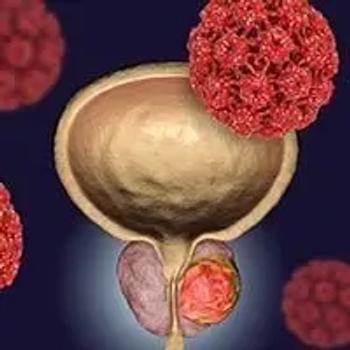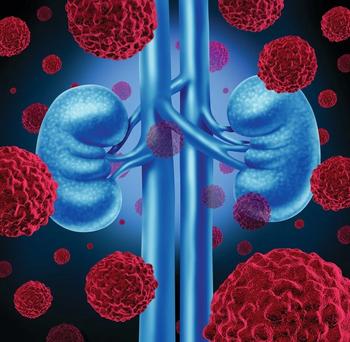
A group of patients with metastatic castration resistant prostate cancer achieved favorable outcomes after receiving treatment with nivolumab in combination with rucaparib.

Your AI-Trained Oncology Knowledge Connection!


A group of patients with metastatic castration resistant prostate cancer achieved favorable outcomes after receiving treatment with nivolumab in combination with rucaparib.

Switching maintenance to darolutamide following taxane-based therapy with at least 1 novel hormonal agent showed statistically significant but clinically modest improvement in radiographic progression-free survival and event-free survival in patents with metastatic castration-resistant prostate cancer.

The combination of ribociclib and letrozole demonstrated a statistically significant and clinically meaningful overall survival benefit compared with letrozole alone in the first-line setting for postmenopausal patients with hormone receptor–positive, HER2-negative advanced breast cancer, according to results from the phase 3 MONALEESA-2 trial.

Circulating tumor DNA was a better predictor for survival than RECIST 1.1 for patients with previously treated, HLA-A*02:01-positive metastatic uveal melanoma assigned to tebentafusp.

The antibody drug conjugate datopotamab deruxtecan demonstrated safe antitumor activity in patients with advanced/metastatic non-small cell lung cancer with actionable genomic alterations.

Vic-trastuzumab duocarmazine yielded an improved progression-free survival over standard physician’s choice chemotherapy in patients with pretreated HER2-positive locally advanced or metastatic breast cancer.

The phase 1b COSMIC-021 trial showed clinically meaningful activity with cabozantinib plus atezolizumab in patients with locally advanced or metastatic castration-resistant prostate cancer who have been previously treated, including patients with high-risk features.

Marina Garassino, MD, discusses the results of subgroup analyses of the phase 2 VISION trial in MET exon 14 skipping mutation–positive non-small cell lung cancer.

The addition of pembrolizumab to chemotherapy with or without bevacizumab significantly improved survival and response rates in patients with persistent, recurrent, or metastatic cervical cancer.

Adjuvant pembrolizumab led to a significant reduction in the risk of disease recurrence or death compared with placebo in patients with resected, high-risk stage II melanoma.

Pembrolizumab plus olaparib may improve prostate-specific antigen response rate in patients with metastatic castration-resistant prostate cancer regardless of homologous recombination repair mutation status.

The combination of pembrolizumab plus olaparib produced promising antitumor activity in men with molecularly unselected docetaxel-pretreated metastatic castration-resistant prostate cancer.

Poziotinib, administered once daily at 16 mg, induced a median tumor reduction of 35% in patients with treatment-naïve non–small cell lung cancer harboring HER2 exon 20 mutations, according to findings from cohort 4 of the ongoing phase 2 ZENITH20 trial.

The addition of relatlimab to nivolumab prolonged benefit beyond initial treatment and first progression and reduced the risk of progression or death after the next line of systemic therapy vs nivolumab alone in previously untreated patients with metastatic or unresectable melanoma.

The combination of osimertinib and bevacizumab did not produce a superior progression-free survival benefit vs osimertinib alone in patients with non-squamous non-small cell lung cancer harboring an EGFR mutation.

Fam-trastuzumab deruxtecan-nxki showcased robust and durable antitumor activity in previously treated patients with HER2-mutant non–small cell lung cancer.

Bradley J. Monk, MD, FACS, FACOG, discusses outcomes with pembrolizumab plus chemotherapy in patients with recurrent or metastatic cervical cancer, as reported in the phase 3 KEYNOTE-826 trial.

Cabozantinib as a second-line treatment showed improved overall survival outcomes compared with second-line axitinib in patients with advanced renal cell carcinoma.

Perioperative treatment with cabozantinib induced responses in patients with intermediate and poor-risk metastatic renal cell carcinoma

Filip Janku, MD, PhD, discusses the results form a phase 1 study of ripretinib, a broad-spectrum KIT and PDGFRA inhibitor, in patients with KIT-mutated or KIT-amplified melanoma.

April Rose, MD, discusses the efficacy results of the ongoing phase 2 BEAVER trial in non-V600E BRAF-mutant advanced solid tumors.

Efficacy outcomes were superior with nivolumab plus ipilimumab compared with sunitinib in patients with advanced renal cell carcinoma.

The addition of toripalimab to platinum-based chemotherapy demonstrated significantly improved survival outcomes in patients with advanced or metastatic esophageal squamous cell carcinoma regardless of PD-L1 expression.

Combining the PARP inhibitor olaparib with bipolar androgen therapy demonstrated promising clinical activity in patients with castration-resistant prostate cancer.

Rechallenge with maintenance olaparib following response to platinum-based chemotherapy significantly improved progression-free survival in heavily pretreated patients with relapsed ovarian cancer, irrespective of BRCA status, according to results of the phase 3 OReO/ENGOT Ov-38 study.

The frontline combination of nivolumab and ipilimumab continued to demonstrate improved overall survival across subgroups compared with standard chemotherapy at 3 years in patients with unresectable malignant pleural mesothelioma.

Findings from a pair of studies presented at the 2021 European Society for Medical Oncology Annual Meeting showed that adding sintilimab to chemotherapy significantly improved overall survival compared with chemotherapy alone in patients with unresectable, locally advanced, recurrent, or metastatic esophageal squamous cell carcinoma and those with unresectable, locally advanced, recurrent, or metastatic gastric or gastroesophageal junction adenocarcinoma.

Erdafitinib in combination with cetrelimab displayed clinically meaningful responses in patients with metastatic or locally advanced urothelial carcinoma harboring FGFR alterations.

Nivolumab and cabozantinib demonstrated significant benefits in progression-free survival and objective response rate for patients with renal cell carcinoma regardless of whether they had a prior nephrectomy.

The European Medicines Agency’s Committee for Medicinal Products for Human Use has recommended the approval of nivolumab plus fluoropyrimidine and platinum-containing chemotherapy as frontline treatment for adult patients with HER2-negative advanced or metastatic gastric cancer, gastroesophageal junction cancer, or esophageal adenocarcinoma with a PD-L1 combined positive score of 5 or higher.